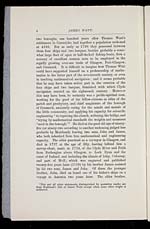James Watt (1736-1819)
James Watt: An oration delivered in the University of Glasgow on the commemoration of its ninth jubilee. An oration by Lord Kelvin
4
JAMES WATT.
__________________________________________
two boroughs, one hundred years after Thomas Watt’s
settlement in Carsedyke, had together a population reckoned
at 4100. But as early as 1700 they possessed between
them four ships and two barques, besides probably a some-
what large fleet of open or half-decked fishing-boats, then a
nursery of excellent seamen soon to be employed in the
rapidly growing over-sea trade of Glasgow, Port-Glasgow,
and Greenock. It is difficult to imagine how Thomas Watt
could have supported himself on a professorship of mathe-
matics in the latter part of the seventeenth century, or even
in teaching mathematical navigation; and it seems probable
that he may have taken active part in the creation of the
four ships and two barques, furnished with which Clyde
navigation entered on the eighteenth century. However
this may have been, he certainly was a public-spirited man,
working for the good of his fellow-citizens as elder of the
parish and presbytery, and chief magistrate of the borough
of Greenock, anxiously caring for the minds and morals of
the little community, and applying his capacity for scientific
engineering “ to repairing the church, widening the bridge, and
“trying by mathematical standards the weights and measures
“used in the borough.”1 He died at the good old age of ninety-
five (or ninety-two according to another reckoning judged less
probable by Muirhead) leaving two sons, John and James,
who both inherited from him mathematical and engineering
capacity. The elder practised as a surveyor in Glasgow, and
died in 1737 at the age of fifty, leaving behind him a
survey-chart, made in 1734, of the Clyde River and Frith
from Rutherglen above Glasgow, to Loch Ryan and the
coast of Ireland, and including the islands of Islay, Colonsay,
and part of Mull; which was engraved and published
twenty-five years later (1759) by his brother James assisted
by his two sons, James and John. Of these the younger
brother, John, died on board one of his father’s ships on a
voyage to America two years later. The elder brother,
1This and all other statements distinguished by quotation marks are
from Muirhead’s Life of James Watt except when gome other origin is
indicated.


